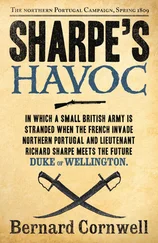Two thousand Muslim heads dropped that day. More! No one knew how many and each year the figure grew with the story’s telling. Carved Muslim heads decorated the archway of the Convent that was built around the place where She had appeared. In the Convent chapel, at the top of the altar steps, was a small patch of polished granite; the place of the Holy Footfall.
And each year on December 8th, the Day of the Miracle, women came to Adrados. It was a woman’s day, not a man’s, and the men would go to the village inn once they had carried the statue of the Virgin, its jewels swaying beneath the gilded canopy, round the village bounds and back to the Convent.
The Nuns had left the Convent two hundred years before, attracted to plumper houses in the plains, unable to compete with the towns where the Holy Mother had been more generous in her appearance, yet the buildings were still good. The chapel became the village church, the upper cloister was a store-place, and one day a year the Convent was still a place for miracles.
The women entered the chapel on their knees. They shuffled awkwardly across the flagstones, their hands busy with beads, their voices muttering urgent prayers, and their knees would take them to the top of the steps. The priest intoned his Latin. The women bent and kissed the smooth dark granite. There was a hole in the stone and legend said that if you kissed in that place and the tip of your tongue could reach the very bottom of the hole, then the baby would be a boy.
The women cried as they kissed the stone; not with sorrow, but with a kind of ecstasy. Some had to be helped away.
Some prayed for deliverance from illness. They brought their tumours, their disfigurements, their crippled children. Some came to pray for a child and a year later they would return and give thanks to the Holy Mother for now they shared Her secret. They prayed to the Virgin who had given birth and they knew, as no man could know, that a woman brought forth her children in sorrow, yet still they prayed to be mothers and their tongues stretched down the hole. They prayed in the candled glory of the Convent Chapel of Adrados and the priest piled their gifts behind the altar; the harvest of each year.
December 8th, 1812. The English came.
They were not the first visitors. Women had been arriving in the village since dawn, women who had walked twenty miles or more. Some came from Portugal, most from the villages that were hidden in the same hills as Adrados. Then two English officers came, mounted on big horses, and with them was a girl. The officers had loud braying voices. They helped the girl from her horse outside the Convent then rode to the village where they paid their respects to the Spanish Commandant over cups of the region’s harsh red wine that was served in the inn. The men in the inn were good humoured. They knew that many of the women were praying for a child and they would be called on to help the Holy Mother in the prayer’s fulfilment.
The other British soldiers came from the east which was strange because there should have been no British soldiers to the east, but no one remarked on the fact. There was no alarm. The British had not been to Adrados, but the villagers had heard that these heathen soldiers were respectful. Their General had ordered them to stand to attention when the Host was carried through the streets to a deathbed, and to remove their hats, and that was good. Yet these English soldiers were not like the Spanish garrison. These red-coated men were foul looking, villainous, unkempt, their faces full of crudity and hatred.
A hundred of them waited at the eastern end of the village, sitting by the washing place next to the road and smoking short clay pipes. A hundred other men filed through the village led by a big man on horseback whose red coat was lavishly looped with gold. A Spanish soldier, coming from the castle to the inn, saluted the Colonel and was surprised when the English officer smiled at him, bowed ironically, and his mouth was almost toothless.
The Spaniard must have said something in the inn for the two British officers, jackets unbuttoned, came into the roadway and watched the last of the soldiers file by towards the Convent. One of the officers frowned. ‘Who the devil are you?’
The soldier he had spoken to grinned. ‘Smithers, sir.’
The Captain’s eyes flicked up the line of soldiers. ‘What Battalion?’
‘Third, sir.’
‘What bloody Regiment, you fool?’
‘The Colonel’ll tell you, sir.’ Smithers stepped into the centre of the street, put a hand to his mouth. ‘Colonel!’
The big man turned his horse, paused, then spurred towards the inn. The two Captains pulled themselves upright and saluted.
The Colonel reined in. He seemed once to have had the jaundice, perhaps to have served in the Fever Islands, for his skin was yellow like old parchment. The face beneath the tasselled bicorne hat twitched in involuntary spasm. The blue eyes, startlingly blue, were unfriendly. ‘Button your bloody jackets.’
The Captains put down their wine cups, buttoned their jackets and pulled their belts into place. One, a plump young man, frowned because the Colonel had shouted at them in front of the grinning privates.
The Colonel let his horse walk two steps closer to the pair of Captains. ‘What are you doing here?’
‘Here, sir?’ The taller, thinner Captain smiled. ‘Just visiting, sir.’
‘Just visiting, eh?’ The face twitched again. The Colonel had a strangely long neck hidden by a cravat that he pinned high on his throat. ‘Just the two of you?’
‘Yes, sir.’
‘And Lady Farthingdale, sir,’ added the plump one.
‘And Lady Farthingdale, eh?’ The Colonel mimicked the Captain’s plummy voice, then he screamed at them in sudden vehemence. ‘You’re a bloody disgrace, that’s what you are! I hate you! Christ’s belly, I hate you!’
The street was suddenly silent in the winter sunshine. The soldiers that had gathered either side of the Colonel’s horse grinned at the two Captains.
The taller Captain wiped the spittle flung from the Colonel’s mouth off his red jacket. ‘I must protest, sir.’
‘Protest! You puking horror! Smithers!’
‘Colonel?’
‘Shoot him!’
The plump Captain grinned, as if a joke had been made, but the other flung an arm up, flinched, and as Smithers, grinning, levelled and fired his musket so did the Colonel bring out an ornate chased pistol and shoot the plump Captain in the head. The shots echoed in the street, the smoke drifted in two distinct clouds above the fallen bodies, and the Colonel laughed before standing in his stirrups. ‘Now, lads, now!’
They cleared the inn first, stepping over the corpses whose blood was spattered on the lintel of the door, and the muskets crashed in the building, bayonets hunted the men into corners and killed them, and the Colonel waved the hundred men who had been waiting at the eastern end of the village into the street. He had not wanted to start this quickly, he had wanted to get half his men up to the Convent first, but these bloody Captains had forced his hand and the Colonel screamed at them, urged them on, and led half his force towards the big, square, blank-walled Convent.
The women in the Convent had not heard the shots fired five hundred yards to the east. The women were crowded in the upper cloister, waiting their turn to shuffle into the chapel on their knees, and the first they knew that the war had at last come in its horror to Adrados was when the red-coated men appeared in the gateway, bayonets levelled, and the screaming began.
Other men were clearing the village houses, one by one, while yet more streamed across the valley towards the castle. The Spanish garrison had been drinking in the village, only a handful were at their posts, and they assumed that British uniforms belonged to their allies and further assumed that these British soldiers could explain the uproar in the village. The Spaniards watched the redcoats come across the rubble of the castle’s fallen east wall, shouted questions at them, and then the muskets fired, the bayonets came, and the garrison died in the mediaeval ramparts. One Lieutenant killed two of the redcoats. He fought with skill and fury, drove more of the invaders back, and he escaped over the fallen wall and ran through the thorn bushes to the watchtower on its hill to the east. He hoped he would find a handful of his men there, but he died in the thorns, shot by a hidden marksman, and the Spanish Lieutenant never knew that the men who had captured the watchtower were dressed not in British red, but in French blue. His body rolled under a thorn bush, crushing the old brittle bones of a raven left by a fox.
Читать дальше












